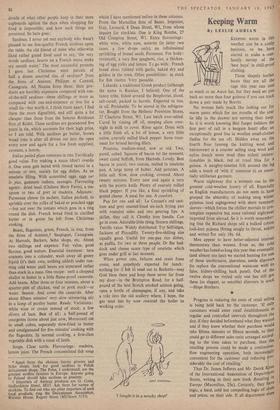Keeping Warm
By LESLIE ADRIAN
KEEPING warm in this weather can be a costly business, so we have started to make a • one- family survey of the 'best buys' in chill-proof clothing.
Those shapely leather boots that are all the rage this year can cost as much as an Ascot hat, but they need set you back no more than four guineas if you can track down a pair made by Brevitt.
No woman feels much like lashing out for warm pants which for ten months of the year lie idly in the drawer not earning their keep. So it is worth knowing that Jaeger (seldom the first port of call in a bargain hunt) offer an exceptionally good line in woollen small-clothes (ladies for the use of). Hidden away on the fourth floor (among the knitting wool and bairnswear) is a counter selling snug wool and nylon (much more wool than nylon) unmen- tionables in black, red or royal blue for a guinea. A naughty-nineties frill around the leg adds a touch of 'with it' nonsense to an essen- tially utilitarian garment.
Warm nightwear (for a woman) can be the greatest cold-weather luxury of all. EspeciallY as English manufacturers do not seem to have grasped the absurdity of making snug winter pyjamas (and nightgowns) with short summery sleeves—which forces the chillier mortals to con- template expensive but more rational nightvvear imported from abroad. So it is worth remember- ing that the Richard shops sell a bulked cotton lock-knit pyjama (fitting snugly to throat, ankles and wrists) for only 18s. 6d. Men appear to have better-adjusted internal thermostats than women. Even so, the cold weather has lasted so long this year that eventually (and almost too late) we started hunting for one of those unobtrusive, sleeveless, suede slipovers (to replace the conventional waistcoat with' its false, kidney-chilling back panel). Out of the twelve shops we visited only one has still got these (so elegant, so sensible) slipovers in stock —Hope Brothers.
Progress in reducing the costs of retail selling is being held back by the customer. 'If onlY customers would enter retail establishments at regular and controlled intervals throughout the day, if they decided beforehand what they wanted and if they knew whether their purchase would take fifteen minutes or fifteen seconds, so they could go to different sales units arranged accord- ing to the time taken to purchase, then the retailing process could be made a continuous' flow engineering operation, both increasid8IY convenient for the customer and reducing On" siderably the cost of retailing.'
Thus Dr. James Jefferys and Mr. Derek Knee of the International Association of Department Stores, writing in their new book Retailinit in Europe (Macmillan, 25s.). Certainly, they llave logic, a hard, cold but compelling logic of eb sts and prices, on their side. If all department store customers paid for all their purchases in one go (as they can do at Marks and Spencer's if they use Shopping Cards, at Harrods if they use Country Cards, and anywhere where they have accounts) it would do away with all those cash registers, floats and harassed assistants counting out small change. But the customer must con- tribute to speed and efficiency by being more decisive and, perhaps, having more sales resis- tance. And there's another clue. Sales assistants must try to stop selling us things we don't want. The commission system must go.
What the authors must remember is that lhe customers are the object of the retail trade's business (though store tycoons may think that the real target is higher profits). I would remind them of a slogan once coined by BOAC, osten- sibly to keep their staff on their toes: 'Passen- gers are the object of the efficient performance of our duties, and not a hindrance to it.'
1 have often thought, when paying to enter a foreign museum or art gallery, how fortunate we are in this country to be able to walk in and out of these priceless collections without part- ing with even a token sum. This privilege costs the taxpayer between £3 million and £4 million a year.
But Covent Garden Opera House costs nearly £700,000, and, as a recent issue of Trend observes, the seats there `are neither free nor easily available.' Only a week or two ago when Kapellmeister Klemperer was unexpectedly taken ill, the ticket-holders who had had to listen to the interpretation of a lesser baton-wielder received refunds of up to 15s. a seat. As soon as a popular work or a performer is billed, the price of tickets goes through the roof, and the boys and girls (mostly girls) start queuing up with their blankets and Thermos flasks of soup for the cheaper seats.
Is this really the way in which to run a national opera house that cannot survive with- out subsidy? 1 am not (yet) suggesting free performances but, as Trend says, 'the taxpayer who repeatedly fails to get seats at what he regards as a reasonable price- has cause to grurnble.' The authorities who have charge of the art galleries repudiate admission payments on the grounds that the taxpayer should not be made to pay twice, but a hell of a lot of tax- payers never get the chance to pay at all at Covent Garden.
A bright idea by a hairdresser: John Junior (31 Thurloe Place, SW7) has had the sense to realise that children are a problem for some women trying to make an appointment to have their hair done. This hairdresser has a nursery and a garden (as well as a children's salon) where children can be left in the hands of a trained nanny while mother is reading her maga- zine under the dryer. if anything goes wrong, the child can be taken to his mother upstairs, but this is rarely necessary. This is the kind of service that a lot more hairdressers could well supply—and the need is no less in the suburbs and outside London. I commend the idea to a trade which is in some danger of making too much out of the affluent society and giving a mite too little in return.































 Previous page
Previous page